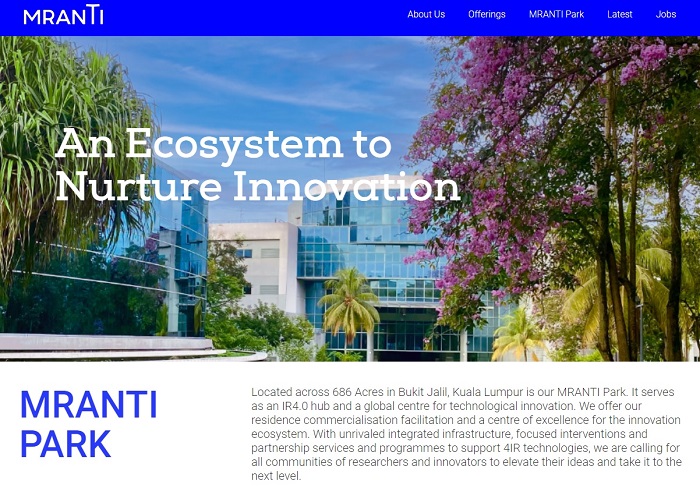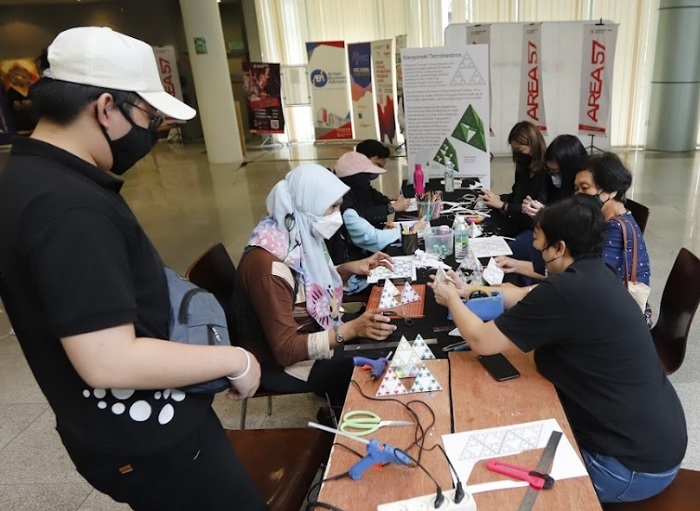MRANTI pushes the innovation transition agenda forward
By Dzuleira Abu Bakar May 12, 2022
- Aims to be THE agency to accelerate Malaysia’s technology commercialisation
- Conducive environment for impactful discourse, exchange of ideas, matching platform

 In the midst of the pandemic, the Malaysian Research Accelerator for Technology and Innovation (MRANTI) was born, representing a convergence of Technology Park Malaysia (TPM) and the Malaysian Global Innovation and Creativity Centre (MaGIC) to streamline and drive higher returns from the Research, Development, Commercialisation and Innovation (R&D&C&I) value chain.
In the midst of the pandemic, the Malaysian Research Accelerator for Technology and Innovation (MRANTI) was born, representing a convergence of Technology Park Malaysia (TPM) and the Malaysian Global Innovation and Creativity Centre (MaGIC) to streamline and drive higher returns from the Research, Development, Commercialisation and Innovation (R&D&C&I) value chain.
Leading up to this, the Ministry of Science, Technology and Innovation (MOSTI) tasked me to spearhead TPM and lead the strategic merger to form MRANTI in April 2021. At that point in time, I was helming MaGIC. In essence, I knew I would be transforming TPM while eventually folding in my team at MaGIC, for a bigger and more dynamic entity.
[MRANTI is named after the Meranti tree, a local tree that also happens to be the tallest tropical tree in the world. As it towers over the forest canopy, it branches out extensively while being firmly and extensively rooted to the ground, withstanding the fiercest of tropical thunderstorms. Just like the Meranti tree, MRANTI will accelerate Malaysia’s innovation ecosystem to stand strong and tall amongst the world’s best. With a strong network branching across diverse industries, and solid foundation rooted in tech and innovation, MRANTI is set to help Malaysia by fast-tracking its technology and innovation commercialisation.]
Merging TPM, a 26-year-old entity, and then seven-year-old MaGIC, comes with its own set of operational and external challenges, beyond any typical mergers and acquisitions (M&A). At the core, there is the matter of culture integration, and at the same time, pressures of managing the bottomline.
Although I’m certain that successive management tried its best, however as one enters TPM the sense of neglect is palpable. This needed urgent attention and has occupied much of my time in the last 12 months, onboarding stakeholders and key players to see this transformation of TPM to MRANTI Park.
My immediate goal is to marshal support from all stakeholders in terms of capital investments, policy, incentives and more, given where I envision MRANTI Park to be.
The merger was completed in record time - under a year. And I’m pleased to say, we are now on the cusp of profitability. With a formidable team, we have put in place a strategy to transform TPM’s Profit & Loss and achieve its technology development mandate for the country. My team and I are focused on improving the state of infrastructure of the park spanning across 686 acres located in Bukit Jalil, to ensure that it continues to attract global players. The park is also now 5G-enabled, giving it the edge in ultra-fast and stable connectivity. Speed is the name of the game, and MRANTI Park will be the fast track.
Transitioning Forward, Together
At a national level, MRANTI aims to tackle issues such as low commercialisation rate, low gross domestic expenditures on R&D (GERD), low R&D spend by the private sector, and overlapping of roles between government agencies. Simply put, a transformational agenda that sets Malaysia on the trajectory of being a technology producer, creator and leader.
We constantly speak about what's being done in other countries and how innovators in other countries are successful in creating solutions that are game changing and resolve the world's pressing problems. Our successful counterparts around the world, such as the Thai Digital Park, Singapore’s A*Star, and Innovate UK, are all a result of strong policy, investment, talent pool and market environment. My aim is to make MRANTI Park a global name.
But it's time we stop comparing and pay attention to what we have such as the opportunities that we can leverage, and get our acts together. Simply put, Malaysia has talent, geographical advantage and more importantly a stable economy. Together, we can take on and be solid contributors to the global technology ecosystem.
My team and I have been relentless in developing the prioritised tech clusters as announced under Budget 2022 at MRANTI Park to make it the foremost innovation hub in Malaysia. Our integrated facilities are being enhanced to take on higher capacity and higher value services.
Today, various programmes are running including the MakersLab, Centre of Excellence for DroneTech, Living Labs for Autonomous Vehicles (AV) and agritech, 5G infrastructure and services and more.
We have lined up 26 key programmes including IP & commercialisation initiatives, impact and thematic accelerators, bootcamps and Digital Business Academy programmes - alongside a host of social impact initiatives this year to jump start the innovation engine.

Accelerating MRANTI’s operations
We spent countless hours working on the back-end to set up MRANTI, as I did not want it to be ‘another’ agency but THE agency which will accelerate Malaysia’s technology commercialisation.
We are aware that there are big gaps which we need to bridge in our efforts to build a strong tech ecosystem. We need to build a strong pipeline, as we have the talent and good inventions that have yet to find a clear pathway to market and eventual profitability. It is important to support commercialisation, including providing the correct infrastructure and development programmes in Malaysia’s journey towards becoming a tech producer.
There is a need for a one-stop centre to enable a strong pipeline of tech products. And that is MRANTI’s mandate. I am really excited but at the same time, it keeps me up at night. This is a big task and MRANTI and I cannot achieve this alone. We need to collaborate, collaborate, collaborate.
To be effective, we need greater cooperation and collaboration from all stakeholders, as it isn’t a single entity’s show. We aren’t in a sprint. It is a long game, and realistically, one year is just the start to drive deep transformation.
A key differentiator to MRANTI lies in the speed at which it connects Government with Industry, Academia and Civil Society - the ‘quadruple helix’ for an innovation ecosystem to thrive. Since MRANTI started operations this year, it has forged several partnerships including with Huawei, Ericsson, Digital Nasional Bhd, SUKE TV and Telekom Malaysia.
We have also inked collaborations with Malaysia’s premier research universities including Universiti Malaya, Universiti Teknologi Petronas, Universiti Sains Malaysia, Universiti Teknologi MARA and Multimedia University. More updates are in the pipeline as we knock on more Technology Transition Office (TTO) doors to bring more research out of the lab into real life.
MRANTI will bring together solution providers, such as researchers, startups and solutions seekers such as corporates. MRANTI will enable a conducive environment for impactful discourse, exchange of ideas and a matching platform.
Building a commercial pipeline
MRANTI was envisioned to be a technology and innovation launchpad to help enterprises, researchers and inventors maximize their Return on Ideas or ROI at a quicker rate, with enhanced scalability and optimised synergies. While the conventional ROI – Return on Investment, conveys fiscal yields from capital outlays, Return on Ideas broadly refers to the conversion of knowledge to fiscal earnings.
Its main mission is to accelerate the creation, development and commercialisation of technology and innovation. By building an innovation pipeline that encompasses the entire value chain, from startups in incubation to high growth technology companies, this will allow Malaysia to strengthen and unlock value in the technology and innovation ecosystem.
Through the National Technology and Innovation Sandbox (NTIS), a 2020 program that I brought on board from my tenure at MaGIC, we have meshed in 35 Innovation Accelerator Network (IAN) partners - which include technology giants, conglomerates and multinationals, while launching 12 multi-site sandboxes for companies in medtech, edutech, constructiontech, agritech, manufacturing, dronetech and more.
The NTIS has helped more than 130 companies thus far, accelerate their innovations and products at various stages, from testing and prototyping to commercialisation, including in agritech, all geared at improving supply of innovation towards commercialisation.
From Intellectual Property to Innovation Perpetuity
IP ownership is widely scattered across organisations, each focusing on differing types of IPs, demonstrating a lack of concerted and coordinated effort between players within the innovation ecosystem.
With a tall order of raising the number of commercialised products to 500 with the Malaysia Commercial Year, by 2025, MRANTI will be actively connecting with the Technology Transfer Offices (TTO)s at Malaysia’s research universities - to transition more products to maturity, while also connecting them to prospective innovation seekers in the market.
Starting with IP audits on the IPs filed within MOSTI agencies, and through a structured review process, the MRANTI team is geared up to evaluate how these can be brought to market.
Volume alone is not sufficient. MRANTI will play a key role in enhancing the quality of startups by offering state-of-the-art infrastructure. Almost 15 companies have signed on as part of the MRANTI Park community since January this year and it is a growing pipeline.
With a new Masterplan for land, leasing and property development including the build out of MRANTI Park Phase 2 and Phase 3, MRANTI will cultivate Malaysia’s capabilities in 4IR - from IoT systems, end-to-end IP services and laboratory to contract manufacturing facilities with advanced technologies. There are plans to roll out six technology clusters in the Park, which are smart cities, green technology, smart manufacturing, biotech, agritech and enabling cluster.

Creating value to the economy and the community
We want to create sustainable value - and by that, it means looking at how we can foster innovation from the start of the value chain, so we have security of supply. There needs to be a steady stream of ideas that can lead to innovation, and onwards to commercialisation.
As such, MRANTI will be launching a 2,000 sq ft MakersLab - a Fourth Industrial Revolution (IR 4.0)-themed playground featuring a spectrum of IR4.0 focused tools, technologies and technology immersion programmes. This learning and development centre is aimed for innovators at all ages, is ideal for sandboxing smaller scale ideas, as well as tinkering of hardware and software in a dedicated space.
This would encourage communities to gather for experiments and collaboration in order to increase local inventions.
At MRANTI’s MakersLab, we want to foster a culture of learning by-doing, innovation, hands-on exploration here — where the community can be involved in the shaping of world-class Malaysian-made inventions which could someday be applied to address critical societal and planetary issues.
Promising start and heightened expectations
According to a recent survey conducted by Ernst & Young Consulting Services (EY), the deployment of 5G technology has the potential to boost Malaysia's GDP by 5%, or RM122 billion, by 2030.
With Kuala Lumpur identified as one of Asia Pacific’s top 10 innovation hubs and with MRANTI strategically offering full-fledged 4IR embedded park services, coupled with programmes and partnership services, it allows local and international innovators and investors alike to seek out MRANTI which offers the full spectrum of services throughout the R&D&C&I value chain.
Naturally, there are high expectations on MRANTI to succeed in carrying out its mandate. This is certainly something that, whilst it keeps me up at night, it also motivates me further to bring into fruition an aspiration that can and will transform Malaysia into a global name in technology and innovation.
We want the world to know us, our innovators and innovations. We want to stand tall and mighty like the Mranti should, and we can be amongst the world’s best. Let’s do this, together.
Dzuleira Abu Bakar is CEO of MRANTI.
Related Stories :


